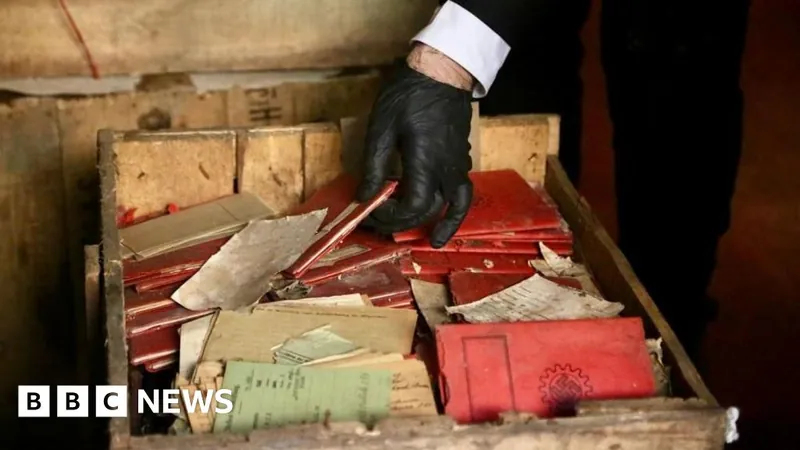
Unearthing the Past: Crates of Nazi Documents Discovered in Argentina's Supreme Court
2025-05-12
Author: Jia
Bizarre Discovery in the Basement
Remarkably, crates filled with historical documents from Nazi Germany have been unearthed in the depths of Argentina's Supreme Court. This startling revelation came to light while workers were clearing space in the court's basement in preparation for a new archive museum.
A Journey from Tokyo to Buenos Aires
These documents are believed to have been dispatched by the German embassy in Tokyo, arriving in Argentina on June 20, 1941, transported via 83 diplomatic pouches aboard a Japanese steamship. Upon their arrival, Argentine customs officials intervened after opening five pouches at random and discovering a trove of Nazi propaganda.
Intriguing Contents and Historical Significance
Last week, workers stumbled upon wooden champagne crates, piquing their curiosity. When opened, one of the boxes revealed materials aimed at promoting Adolf Hitler's extremist ideology in Argentina during World War II. This prompted court officials to secure the documents and reach out to the Buenos Aires Holocaust Museum for assistance in cataloging the items.
Seeking Insight into Nazi Networks
Experts have begun sifting through the materials, which include black-and-white photographs and membership booklets adorned with swastikas. Historians are optimistic that these documents could provide valuable insights into the financial networks and international connections of the Nazis.
The Suspicious Shipment
Originally declared as 'personal effects' by the German embassy in Buenos Aires, Argentine officials became suspicious due to the sheer volume of the shipment. This led to an immediate alert to the foreign minister, concerned that it might compromise Argentina's neutral stance during the war.
A Lasting Mystery
Despite the judge's order to seize all 83 pouches in September 1941, it appears that no action was taken until 1944, long after Argentina severed ties with Axis powers. As a result, the crates remained forgotten and gathering dust for decades.
A Refuge for Nazis Post-War
Following the war, Argentina, under the rule of Juan Perón, became a sanctuary for several high-ranking Nazi figures, including notorious war criminals like Adolf Eichmann and Josef Mengele. In 2000, these dark chapters of Argentina's past were acknowledged when President Fernando de la Rúa issued a formal apology for the country's role in harboring such individuals.
An Unfolding Saga
The rediscovery of these Nazi documents serves as a poignant reminder of a tumultuous history and raises questions about the extent of Nazi influence in Argentina. As historians delve into their contents, the world watches closely, eager to uncover the truths buried within these long-lost files.


 Brasil (PT)
Brasil (PT)
 Canada (EN)
Canada (EN)
 Chile (ES)
Chile (ES)
 Česko (CS)
Česko (CS)
 대한민국 (KO)
대한민국 (KO)
 España (ES)
España (ES)
 France (FR)
France (FR)
 Hong Kong (EN)
Hong Kong (EN)
 Italia (IT)
Italia (IT)
 日本 (JA)
日本 (JA)
 Magyarország (HU)
Magyarország (HU)
 Norge (NO)
Norge (NO)
 Polska (PL)
Polska (PL)
 Schweiz (DE)
Schweiz (DE)
 Singapore (EN)
Singapore (EN)
 Sverige (SV)
Sverige (SV)
 Suomi (FI)
Suomi (FI)
 Türkiye (TR)
Türkiye (TR)
 الإمارات العربية المتحدة (AR)
الإمارات العربية المتحدة (AR)